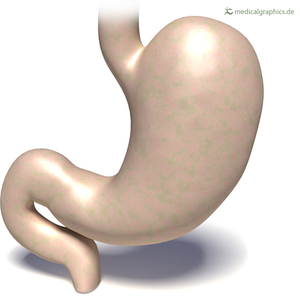Difference between revisions of "Stomach"
(→Key Stage 3) |
|||
| Line 25: | Line 25: | ||
: The [[stomach]] produces [[hydrochloric]] [[acid]]. | : The [[stomach]] produces [[hydrochloric]] [[acid]]. | ||
: The [[hydrochloric]] [[acid]] in the [[stomach]] kills [[bacteria]] to help prevent us getting sick. | : The [[hydrochloric]] [[acid]] in the [[stomach]] kills [[bacteria]] to help prevent us getting sick. | ||
| − | : The [[stomach]] digests food using [[Digestive Enzyme|digestive enzymes]] including | + | : The [[stomach]] [[Digestion|digests]] food using [[Digestive Enzyme|digestive enzymes]] including a [[protease]] called [[pepsin]] which breaks down [[protein]]s into [[Amino Acid|amino acids]]. |
: The [[Digestive Enzyme|enzyme]]s in the [[stomach]] work best in [[acid]]. | : The [[Digestive Enzyme|enzyme]]s in the [[stomach]] work best in [[acid]]. | ||
Revision as of 16:26, 5 November 2018
Contents
Key Stage 1
Meaning
The stomach is a part of the body where our food goes when we eat it.
Key Stage 2
Meaning

A computer image of the stomach.
The stomach is a part of the digestive system and digest our food.
Key Stage 3
Meaning
The stomach is an organ in the digestive system which breaks down food molecules into small molecules using enzymes.
About the Stomach
- The stomach produces hydrochloric acid.
- The hydrochloric acid in the stomach kills bacteria to help prevent us getting sick.
- The stomach digests food using enzymes.
- The enzymes in the stomach work best in acid.
Key Stage 3
Meaning
The stomach is an organ in the digestive system which breaks down food molecules into small molecules using enzymes.
About the Stomach
- The stomach produces hydrochloric acid.
- The hydrochloric acid in the stomach kills bacteria to help prevent us getting sick.
- The stomach digests food using digestive enzymes including a protease called pepsin which breaks down proteins into amino acids.
- The enzymes in the stomach work best in acid.